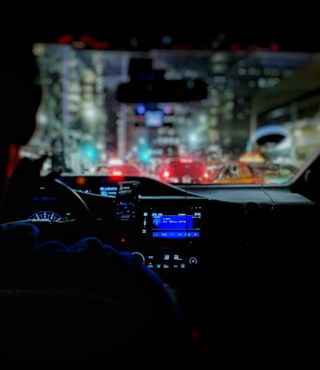
Driving in the Dark: Could You Need Glasses?
As the nights grow longer and the winter darkness settles in, the challenges of driving in low light become more apparent.
With reduced visibility and increased glare, you might wonder if your vision is up to the task. In fact, poor eyesight contributes to around 3,000 road accidents annually in the UK, with fatalities more likely to occur during night-time driving.
Charlotte Cook, Optometrist at Bayfields Opticians and Audiologists, explains:
“Visibility is a key factor in safe driving, and during the winter months, reduced light conditions put us at greater risk of accidents. Many people aren’t aware that not wearing necessary glasses while driving can result in a £1,000 fine or even disqualification. Vision issues often develop gradually, especially after the age of 45, making regular eye tests essential for road safety.”
So, how can you tell if your vision needs support? Here are some warning signs Charlotte recommends watching out for.
Do you find yourself squinting at oncoming headlights or noticing halos around bright lights? This could signal an underlying issue with your vision.
“At night, our pupils dilate to adapt to lower light, but when faced with bright headlights, they struggle to adjust quickly,” says Charlotte.
This sensitivity could indicate conditions like cataracts or the need for updated glasses. Anti-glare driving lenses may also help reduce the discomfort and improve clarity.
Struggling to estimate the space between your car and others on the road? This could be a sign of impaired depth perception, exacerbated by low-light conditions.
“Darkness eliminates helpful visual cues like gradients and colours, making it harder to judge distances,” Charlotte explains.
To stay safe, leave extra room between vehicles and consult an optometrist for tailored solutions.
If you’re squinting to read road signs, particularly in dim light, you might be experiencing myopia (short-sightedness). This can lead to eye strain and even headaches after prolonged driving.
“When your eyes work overtime to focus, it can result in discomfort and further deterioration over time,” warns Charlotte.
An eye test can help pinpoint the issue and provide corrective lenses to improve clarity.
Feeling nervous about driving at night? Vision issues might be the hidden cause. Reduced light levels force your eyes to work harder, and if your eyes take longer to adjust, driving can feel overwhelming.
“Recognising the early signs of vision problems can restore confidence and make night-time driving much safer,” Charlotte advises.
Vision changes are a natural part of aging, but they often go unnoticed until they start affecting daily life, like driving. Regular eye exams every two years can catch issues early and ensure you’re equipped to drive safely, day or night.
If you are concerned about your eye health or would like advice please contact your practice here.
